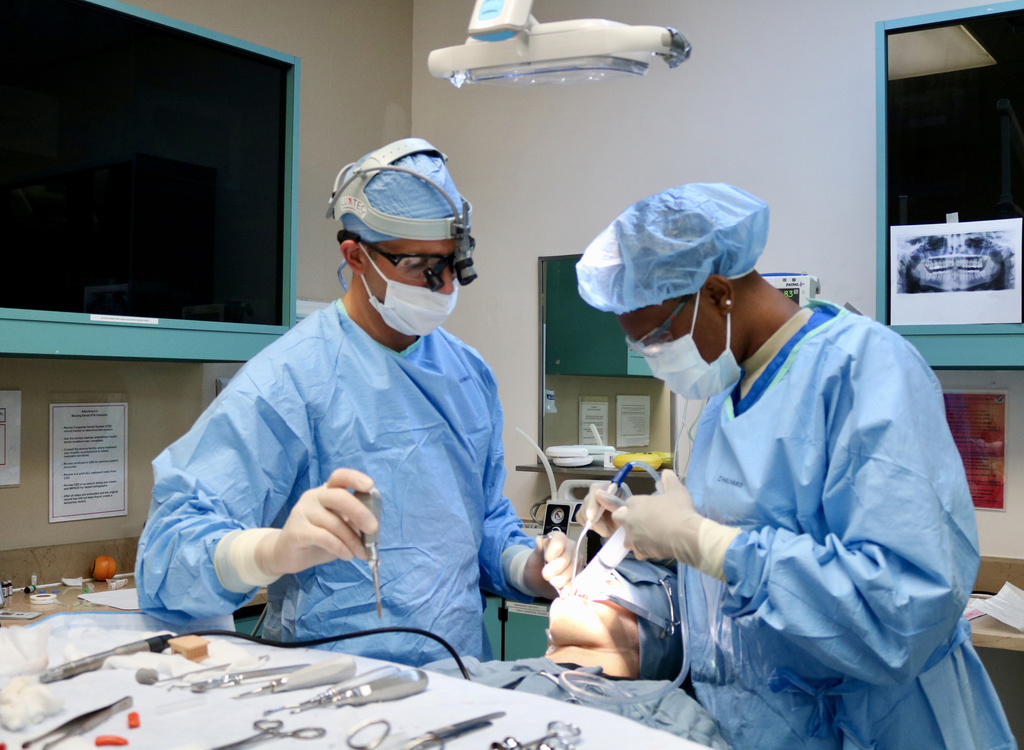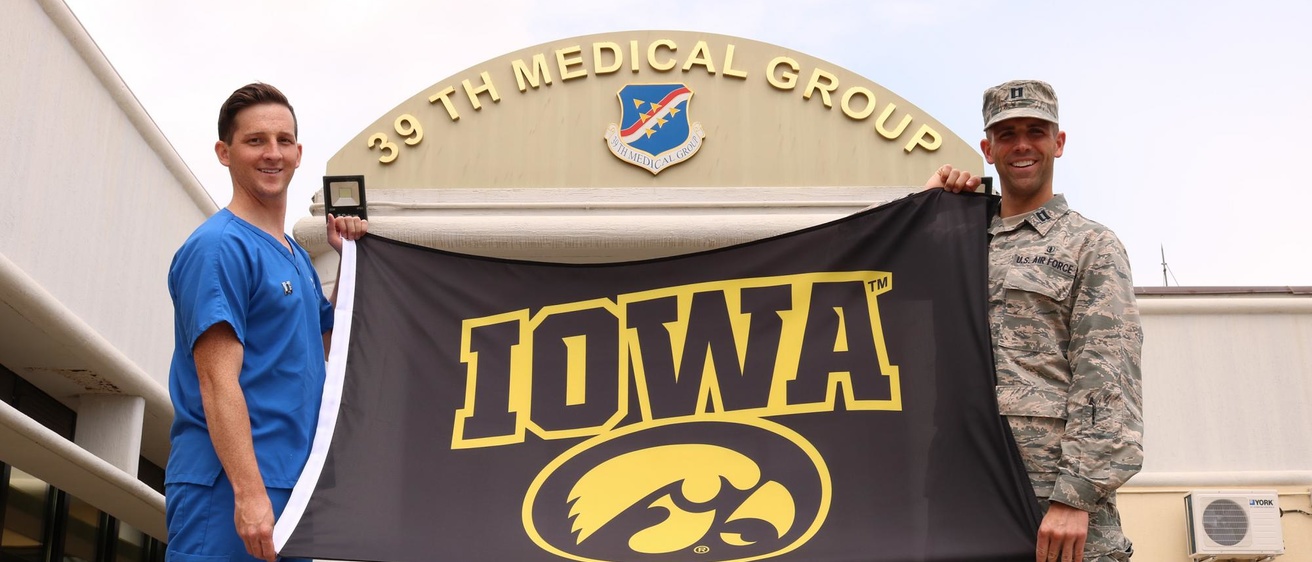Less than two years after studying together at the University of Iowa College of Dentistry, Lucas Borg and John Lorenz found themselves last fall reuniting 6,000 miles from Iowa City as they began separate, yearlong assignments at Incirlik Air Base near the city of Adana, Turkey.
While many of their fellow 2017 graduates have been focused on establishing dental practices and treating patients, Borg and Lorenz have been serving anyone on the international base who requires emergent dental care—whether military or civilian, American or Lithuanian, Spanish or Turkish.
“Our patient base is clearly defined, and everyone makes it to their annual exams,” says Lorenz, a U.S. Air Force captain and member of the 39th Medical Group. “There are no finances or insurance to worry about, and any treatment we deem necessary they will receive.”
Built in the 1950s, the base at Incirlik has served as a strategic site in military relations among the U.S., Europe, and the Middle East. In the 21st century, it became an important waystation in the air campaign against the Islamic State.
Since July 2016, after the failed coup attempt against Turkey’s President Recep Tayyip Erdoğan, Incirlik became a restricted base. All families and most non-active duty military personnel were removed from the station and sent home. The remaining service members are not allowed to leave the roughly 5 square miles within the base’s boundaries due to safety reasons.
“A common joke you will hear is that we are living on a cruise ship where you see (the) same people at all the sponsored events that you can choose to go to,” says Borg, a captain and a member of the same unit.
While Borg and Lorenz cannot leave the grounds, the gates and fences of the base border the Turkish village of Incirlik. The pair regularly has a clear view of the larger city of Adana and occasionally, Borg says, he catches sight of “a magnificent snowcapped mountain range,” the Taurus Mountains, that constantly call his name.
“If you stayed a while to watch their housing developments, streets, parks, and shops, you see regular life being lived,” Borg says. “At first, my first perception was that they were the bad guys and that it was danger beyond the fences. As I have been here for six months, I’ve started to realize they are just regular people living their life on the other side of the fence.”
When Lorenz arrived in August 2018, he found Incirlik packed with activity. Rather than use automobiles, most people travel across the base by bicycle or scooter—often with Bluetooth speakers blasting a favorite song.
“It generates a surreal yet energetic vibe, which is quite charming,” Lorenz says.
Immediately after graduating from Iowa in 2017, both men chose to pursue a one-year Advanced Education in General Dentistry program through the U.S. Air Force. Lorenz went to California; Borg to Washington, D.C.
Lorenz decided fairly early into the program that he next wanted to go to Incirlik. He mentioned his plans to Borg before finalizing the decision, and Borg decided to go a few weeks later.
“One of my greatest concerns was getting stuck in a clinic that only has three total dentists (one of those being the commander) and bumping heads with those people for a year,” says Borg. “Knowing that one of those people was going to be not only someone that I could trust to work with, but was also a friend, made my decision to sign up for the year commitment a lot easier.”

A typical day for the two consists of getting up about 6:30 a.m., grabbing a light breakfast, and riding their bikes to the clinic. The dentists work until 4 or 4:30 p.m. and then head off for socializing in the evening. Lorenz goes to the gym or to dance lessons. Borg has earned several fitness certifications and teaches indoor cycling and high-intensity interval training (HIIT) classes.
“You won’t see a weekend pass without some sort of activity on base; anywhere from a triathlon, concert, or food festival, there is something to keep you occupied,” Lorenz says. “Although I will only have been here a year, I have made several lifelong friends.”
The dental clinic, with its 10 treatment rooms, was designed for a larger number of people who used to live and work on the base. And the pair’s responsibilities extend beyond the clinic.
“Due to our unique location, we need to be ready for anything—more than other bases may need to be,” Borg says. “I am the triage team lead for our treatment facility, so in the case of a mass casualty or some sort of event that requires the triage of casualties, my team will be ready to provide assistance to save as many lives as possible.”
Because dental referrals usually require an hours-long flight to Germany, Borg and Lorenz likewise are encouraged to expand their skills by performing more complicated procedures. As a result, they provide a comprehensive practice, including endodontics, periodontics, oral surgery, and orthodontics.
“Leaving dental school, I would not have felt comfortable taking out wisdom teeth on a regular basis due to my experience, but also my speed,” Borg says. “My residency last year provided me the experience needed. Being in the Air Force, I have the ability to take quality time for the procedure without having to worry if I can do enough extractions to pay the bills.”
Unlike their colleagues in the States, Borg and Lorenz don’t have to worry about competition in the local marketplace or about navigating insurance claims. As a result, even as political tensions remain high between Turkey and the U.S., Lorenz says he and Borg are working in “a very low-stress environment where we can deliver patients the best treatment possible.”
By volunteering to serve a year in Incirlik, the pair will have a greater say in where their next assignments will take them. Lorenz plans to leave in August for a two-year assignment at Ramestein Air Force Base in Germany. Borg plans to leave in October for a similar post in Spangdalem, Germany.
Both credit the education they received at the UI College of Dentistry with providing them with the training and experience they need to succeed as a team.
"I owe all my higher education to the University of Iowa, and I can say that I have always felt I have the tools to overcome any of the challenges presented to me,” says Lorenz. “It has been many years of hard work, but I would do it all the same if I could go back.”
Neither is sure what his long-term plans will be after leaving the Air Force.
Lorenz grew up north of Chicago, but his years at the UI made Iowa City a second home—and a place that he plans to return to frequently.
“While I will likely settle somewhere in Illinois closer to my family, Iowa City will never be far away,” Lorenz says.
Originally from Ames, Iowa, Borg attended Baylor University in Waco, Texas, for his undergraduate studies. While he was away, he says he came to realize how “awesome” Iowa actually is.
He has another seven years committed to the Air Force, but says he would welcome the opportunity to return to his home state.
“The day that I do leave the Air Force, I’m not sure where I’ll be or what my life would look like, but Iowa will always be an option of a place to settle because of my respect and love of the state and its people,” Borg says.
